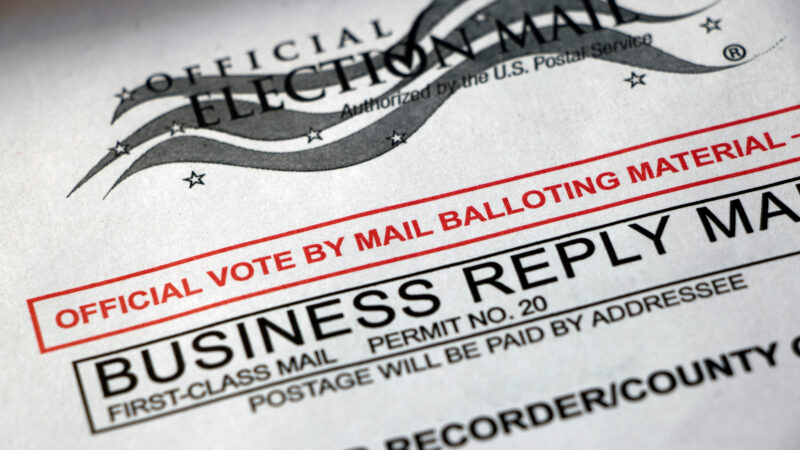Alabama asks court to lift block on limits to absentee ballot applications
MONTGOMERY, Ala. (AP) — A judge was wrong to block part of an Alabama state law that makes it a felony to provide gifts or payments for helping with an absentee ballot application, state attorneys told an appeals court panel Tuesday.
The Alabama attorney general’s office asked the 11th U.S. Circuit Court of Appeals to lift a judge’s preliminary injunction last year that found the gift and payment ban is “not enforceable as to blind, disabled, or illiterate voters.”
The state argued the provision is needed to prevent paid political operatives from preying on vulnerable voters. But a lawyer representing groups that challenged the law argued it violates the Voting Rights Act’s guarantees of assistance for voters who need it.
The three-judge panel did not indicate when they would rule.
The 2024 law restricts who can help with absentee ballot applications. The law makes it illegal to distribute an absentee ballot application that is prefilled with the voter’s name or to return another person’s absentee ballot application. It also makes it a felony for a third party to receive a payment or a gift “for distributing, ordering, requesting, collecting, completing, prefilling, obtaining, or delivering a voter’s absentee ballot application.”
The issue before the court Tuesday dealt only with how the gift and payment ban impacts voters who are blind, disabled or can’t read or write.
Attorney Anuja D. Thatte of the NAACP Legal Defense Fund argued the law violates Section 208 of the Voting Rights Act. The section ensures voters, who require assistance to vote because of blindness, disability, or the inability to read or write, can get help from a person of their choosing. Thatte said the Alabama law tries to improperly narrow the pool of assistors.
“It’s a sweeping statute that criminalizes, with up to 20 years in prison, broad forms of absentee application assistance and assistors, thereby plainly restricting the federal right of 208 voters,” Thatte said. She argued that home health aides, employees of disability programs and others could face prosecution.
Alabama Deputy Solicitor Alexander B. Bowdre said voters can still get assistance from the person they choose. He argued the provision only prohibits gifts or compensation to a third party.
He also described the provision as a protective measure to protect a vulnerable voter from being manipulated or coerced.
“That is more likely if you have a paid operative showing up to provide assistance. That is less likely if the voter is able to choose someone whom they know and trust and there’s no money exchange in the equation,” Bowdre said.
Judges asked a number of questions about the wording of the law and who would be impacted. Circuit Judge Andrew Brasher, who served as Alabama’s solicitor general before becoming a federal judge, asked if a voter could pay someone to help with the ballot application.
Bowdre replied that they could be paid because that person would be considered an agent of the voter and not a third party. Thatte said the wording of the law is vague and does not define who is considered a third party.
The Alabama State Conference of the NAACP, the League of Women Voters of Alabama Education Fund and the Alabama Disabilities Advocacy Program filed a lawsuit challenging the law. The injunction blocked only one portion of the law, and most of it remains in effect. Alabama is one of several Republican-led states imposing limits on voter assistance.
Bill making the Public Service Commission an appointed board is dead for the session
Usually when discussing legislative action, the focus is on what's moving forward. But plenty of bills in a legislature stall or even die. Leaders in the Alabama legislature say a bill involving the Public Service Commission is dead for the session. We get details on that from Todd Stacy, host of Capitol Journal on Alabama Public Television.
My doctor keeps focusing on my weight. What other health metrics matter more?
Our Real Talk with a Doc columnist explains how to push back if your doctor's obsessed with weight loss. And what other health metrics matter more instead.
Baz Luhrmann will make you fall in love with Elvis Presley
The new movie is made up of footage originally shot in the early 1970s, which Luhrmann found in storage in a Kansas salt mine.
Forget the State of the Union. What’s the state of your quiz score?
What's the state of your union, quiz-wise? Find out!
A team of midlife cheerleaders in Ukraine refuses to let war defeat them
Ukrainian women in their 50s and 60s say they've embraced cheerleading as a way to cope with the extreme stress and anxiety of four years of Russia's full-scale invasion.
As the U.S. celebrates its 250th birthday, many Latinos question whether they belong
Many U.S.-born Latinos feel afraid and anxious amid the political rhetoric. Still, others wouldn't miss celebrating their country








